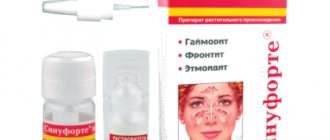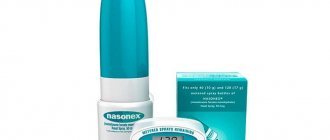Rhinitis is swelling of the mucous membrane of the nasal cavity, which is accompanied by a particular narrowing of the nasal passages and the release of mucus that accumulates inside the nasopharynx. As a result, breathing problems begin, which bring a lot of discomfort to the patient’s life.
If the process is started or timely treatment is not started, then rhinitis becomes chronic, which is fraught with various complications. Essential oils that are suitable for adults and children are great for a runny nose. How to use them, and are there any contraindications?
Efficiency of oils
One of the measures to combat rhinitis, the effectiveness of which has been confirmed by numerous positive experiences, is the use of essential aromatic oils. These drugs have high therapeutic efficacy and do not cause side effects.
Oils have a lot of positive qualities. Their composition is completely natural and safe. The use cannot cause complications that are caused by synthetic medications. Many esters have several therapeutic effects, so they are used not only for treatment, but also for the prevention of rhinitis.
During a severe runny nose, the mucous membrane of the nasal cavity becomes irritated and becomes covered with ulcers and crusts. If you do not pay attention to treatment, a chronic form of rhinitis will form.
With this problem, the mucous membrane gradually atrophies, and the runny nose becomes endless. To avoid such a disease, it is necessary to put ether into the nasal cavity, especially during the epidemic season.
What happens when oils enter the body:
- The process of blood circulation accelerates.
- The swelling subsides.
- Toxins come out.
- The results of the viral decay are coming out.
- The body's protective functions (immunity) increase.
- The mucous membrane is healing.
- The irritation is relieved.
- Bacteria and viruses stop reproducing.
- May help treat sinusitis.
- The cough goes away.
Of course, pharmaceutical drugs have a quick effect, unlike their ethereal counterpart. However, they can lead to many side effects. Suitable for patients of any age, eliminates congestion and itching. The effect appears within a day.
Pharmacodynamics and pharmacokinetics
Pharmacodynamics
A local irritant that, when applied to the skin, has an antimicrobial, anti-inflammatory effect and reduces itching. The distracting effect is accompanied by a feeling of cold and the elimination of pain. The feeling of cold turns into a feeling of unexpressed burning and tingling.
Irritation of skin or mucous membrane receptors stimulates the release of biologically active substances that are involved in the regulation of pain. When applied to the skin in the temple area, it has an anti-migraine effect.
The tone of not only superficial vessels, but also those located in the internal organs changes reflexively. When taken under the tongue - a reflex coronary dilating, antianginal effect. Has a weak analgesic effect in small doses.
Pharmacokinetics
When applied topically, resorptive effects do not appear.
Types of procedures
The type of oil you use depends on your treatment goal. Vaseline is used to moisturize the mucous membrane during an allergic reaction. If rhinitis is caused by an infection, then tea tree essential oils are used.
Therapy with such drugs may be discontinued if there is hypersensitivity to one or another component of the composition.
The substances found in oils are extracted from thuja, sea buckthorn, and camphor. These components may cause an allergic reaction in young children and pregnant women. The drug can be used after diluting it in water.
Use for children from one year old:
- Nasal drops.
- Nose lubrication.
- Laying soaked turundas.
- Inhalation.
- Massage.
- Ingestion.
The first method is used in a situation where the disease is at the initial stage, there is no stuffy nose, and there is little sputum. The event helps relieve itching and burning, and reduce sore throat. When used for children, it is best to dilute with water and drop before bedtime.
In the absence of elevated temperature and blockage of the nasal passages with mucus, inhalation is used. You can use a nebulizer (inhaler), inhalation of vapors, or you can do it differently.
A cotton swab is moistened in essential oil, previously diluted in liquid, and smeared under the nose and around the nostrils. This helps you breathe easier during colds and fight complications.
For nasal congestion, use cotton wool with etherols. To improve the functioning of the immune system, you need to add a few drops of the product to honey or herbal decoction.
By using essential oil to massage the wings of the nose, you can quickly get rid of swelling.
Composition: Menthol oil
Menthol is used in various fields:
- medicine – treatment of dislocations, fractures, colds, diseases of the cardiovascular system, respiratory tract (tracheitis, sinusitis, laryngotracheitis, bronchitis);
- food industry – production of drinks, sweets and confectionery;
- cosmetology – improving the condition of skin and hair.
The oil contains up to 50% menthol, 10% neomenthol and up to 10% menthone. The rest is occupied by limonene, pinene, terpinene, carvacrol, and methyl acetate.
Menthol.
A solution of menthol (synthetic or natural) in petroleum jelly.
In 1000 g of oil solution of levomenthol 10 g or 20 g, vaseline oil 990/980 g.
Oil solution 1% or 2% in glass bottles of 10 ml and 25 ml for topical use and inhalation.
Locally irritating.
Tea tree
Essential oil for a runny nose is a complex natural remedy. It has increased antibacterial properties. Fights viruses and relieves inflammatory processes.
The oil copes well with rhinitis, and its use during outbreaks of respiratory diseases can provide high-quality prevention of their occurrence.
Immediately after use, discomfort is relieved. Inflammation and swelling go away, and there is less discharge.
In addition, tea tree has a calming effect, relieves stress, relieves panic and fear. The development of the process of reproduction of bacterial pathogenic microflora is suppressed, however, the bacteria do not die.
Another property is diaphoretic. The waste of toxic substances is stimulated, and the body begins to steadily resist diseases. Discomfort from long-term illnesses disappears.
Contraindications
The use of the drug in the form of drops or inhalations is not recommended for patients whose examination revealed the following conditions:
- Individual intolerance.
- Bronchial asthma.
- Pregnancy.
In addition, menthol oil is contraindicated for children under 3 years of age and women breastfeeding. There are no other restrictions for the use of the product.
Despite the fact that the drug contains a well-known substance - menthol - in certain situations you need to be careful with it.
Menthol oil in ENT practice is intended for topical use for runny nose and other respiratory diseases: in the form of nasal drops or inhalations. But, as with other drugs, you must first consult with your doctor to establish a diagnosis and exclude contraindications.
Eucalyptus
Eucalyptus oil has similar properties to tea tree-based preparations. Can serve as an alternative. An excellent antiseptic component, active fight against viruses and bacteria.
Eucalyptus can reduce fever and eliminate inflammation. In addition, it has an expectorant property and an effect aimed at strengthening the immune system.
Used to treat rhinitis with green discharge. The effect of eucalyptus ester can be enhanced. If you mix it with other ingredients.
This advice is especially appropriate when inhaling with essential oils for a runny nose. Add the following oils to eucalyptus for inhalation for a runny nose:
How is the oil used?
Due to the beneficial effects of menthol and the healing properties of peppermint, menthol oil is used in many areas of human activity. Its use is justified for pain, itching, and for cosmetic and industrial purposes. How is this oil used?
- In pharmaceuticals, it is used to make remedies for nausea and itching, antiviral and anti-inflammatory drugs, painkillers and antispasmodics. Menthol oil is added to children's syrups and cough tablets, as well as to some external remedies.
- In the food industry, it is indispensable in the production of candies, chewing gum and drinks.
- In the production of household chemicals, the deodorizing property of the oil is used. It is added to detergents, air fresheners and washing powders.
- Menthol oil is also widely used in cosmetology. The price in pharmacies for it is quite low compared to most cosmetics, and it has a beneficial effect on the skin and hair.
Camphor oil
Camphor oil is considered a very effective antiseptic, the therapeutic effect is extensive: the fight against runny nose, cough, and inflammatory muscle processes.
During an exacerbation of a cold, it is recommended for every person to use. For the treatment of rhinitis, camphor is used as aromatherapy, inhalation, and indoor air freshening.
Drops based on this component can eliminate the symptoms of a cold. To make them, take equal dosages of vegetable oil, tincture of propolis and camphor, respectively. The mixed composition is dripped into the nasal cavity three times a day.
The product belongs to the group of highly toxic products, so it cannot be used externally. The broadcast is strictly prohibited for people who suffer from:
- Epilepsy.
- Heart disease.
- Problems with blood vessels.
This is due to the fact that they excite the body and increase the load on the heart.
The use of essential oils for the treatment of allergic or acute childhood rhinitis
Using extracts, you can relieve nasal congestion even in small children. It is not necessary to instill oil into the nasal passages. You can moisten napkins with one type of extract, and then place them in different places in the room, including near the crib.
Aromatic bath
Children love to swim, so there is an excellent method for treating a runny nose in children - an aromatic bath. Kids don’t like steam inhalations, because it’s hard to make them sit, and even with their heads covered.
But when preparing a bath, remember that the water should not be hot. The optimal value is no more than 38°. In addition to essential oil, for example, peppermint, cypress, eucalyptus, add some gel to the water. Swimming in foam is much more interesting for children. The child should stay in the bath for no more than 15 minutes. This time is enough to get rid of nasal congestion.
Fir oil
Fir oil is an excellent remedy for helping in the treatment of rhinitis. Actions:
- Removing the inflammatory process.
- Fighting germs.
- Disinfection.
Use is appropriate for acute type of rhinitis, discomfort symptoms are instantly eliminated, breathing becomes difficult, mucous membranes are freed from swelling. The inflammation process is softened, the vessels become narrower, this leads to less secretion and formation of mucus.
It has a very pungent, peculiar smell that not everyone will like. If you suffer from migraines while using it, stop therapy.
Treatment of babies
Since small children love the bathing procedure, two drops of mint, eucalyptus and cypress essential oils should be added to a warm bath. After such an event, breathing through the nose will improve, nasal congestion will disappear.
To speed up the treatment of rhinitis in infants, you can do cold inhalation. To do this, use tea tree oil or its alternative - eucalyptus.
The baby will sleep soundly and peacefully without a runny nose if you place a napkin dipped in etherol near his crib or on his pillow. You can add beneficial esters to your humidifier.
If your child suffers from a cold, you can use chamomile oil. It is unique in that it does not cause allergic reactions and exhibits antiseptic properties.
Lemon essential oil can make thick nasal discharge thinner. Sage stops the activity of bacteria. Breathing becomes easier during flu and colds if you use mint remedies. The “Star” balm works well.
Before any use of esters, an allergic reaction of the child should be excluded. Contact your pediatrician before starting home treatment on your own. The doctor will give the correct and effective prescription for eliminating the problem.
Mullein for a severe runny nose with watery eyes
1 tbsp. dry flowers, pour 400 ml of boiling water, leave, wrapped. 4 hours, strain. Drink 100 ml 2-3 times a day for cough, whooping cough, severe runny nose with lacrimation, hoarseness and shortness of breath.
Soapwort will help with nasal problems
For a severe runny nose, when you start to choke, pour 1 teaspoon of crushed soapwort root into a glass of water and leave in a cold place for 8 hours, then bring to a boil, cool, strain. Rinse your nose with the broth and gargle until the nasal congestion completely disappears. Prepare 0.5 liters of decoction at once. Rinse your nose with a pipette, each time increasing the amount of decoction, and gargle frequently and thoroughly, with plenty of liquid. After the first use of soapwort decoction, you will understand that life is starting to get better, and in 3 days you will forget about your problems.
A simple and effective remedy for rhinitis
When you have a runny nose, the following simple treatment helps: Put a cracker of black bread on a hot frying pan and do not turn off the heat. Soon the cracker begins to smoke. This is the medicine. Inhale the smoke through your nose for 2-3 minutes. Then you can throw away the burnt cracker; it is no longer good for anything. This procedure must be done several times a day. A runny nose goes away very quickly! Soon you won't even remember that you had it.
How to overcome malaise and runny nose
And everything is done simply, you just need warm water and the desire to be cured. In the morning, while washing your face, you need to take warm water into your palm and inhale a small amount into one nostril. After this, blow your nose well. Repeat the same procedure with the second nostril. That’s all, actually – a simple and absolutely harmless exercise. You can repeat it several times a day (depending on the intensity of the runny nose), but after the first time you will feel significant relief. And when the procedure is completed within three days, the runny nose completely disappears, and you are again full of strength and energy, and nothing prevents you from living and enjoying life. You will be able to forget about handkerchiefs and nasal voice for a long time. The recipe has been tested many times
Onion medicine
With the cold, we are again attacked by unpleasant diseases - colds, flu and, of course, a runny nose. Nobody would call a runny nose a serious illness, but it does cause a lot of discomfort. A good method for treating a runny nose. This is a very effective remedy. With long-term use, it can cure even chronic runny nose. So, take the onion, peel it, grate it and squeeze out the onion juice. It is very hot, so the juice must be diluted. Add 1 drop of onion juice to 1 tablespoon of warm boiled water. Place this mixture in your nose (in both nostrils) every hour. If you are working or just can't do it, drip as often as you can. The effect just won't come as quickly.
Inhalations: aloe with eucalyptus
For an infectious runny nose, a good effect is obtained by introducing fresh aloe or Kalanchoe juice into the nostrils, 3-5 drops every 2-3 hours for 2-3 days. Inhalations help with a runny nose. They are best made with boiled potatoes and eucalyptus. When the potatoes are well boiled, throw 2 tbsp into the pan. tablespoons of dry eucalyptus leaves (it is sold in any pharmacy). Cover with a towel and breathe over the broth for 10-15 minutes. The procedure is carried out 2 times a day, 30 minutes after lunch and at night. You also need to drink more mineral water. Viruses that cause acute respiratory viral infections and acute respiratory infections do not like an alkaline environment. You can also drink lingonberry juice 3-4 times a day.
Union of horseradish and lemon
• For chronic runny nose, mix horseradish and lemon juice in a 1:1 ratio. Take 1/2 teaspoon 2 times a day and do not eat or drink anything for 30 minutes after taking it. In the first week, severe lacrimation and a profuse runny nose are possible. Subsequently, nasal discharge stops. Follow the dosage, as horseradish can increase blood pressure. • If you have a stuffy nose, to thin the mucus, wash 500 g of horseradish root with a brush (do not peel), pass through a meat grinder, pour in 1.5 liters of cold water, leave for 12-15 hours, strain, squeeze. Pour boiling water over the pomace so that the water just covers the mass. When it cools down, strain again, squeeze, discard the cake, pour the liquid into a jar and add 0.5 liters of honey, mix, cover with gauze and put in the refrigerator. Take 2 tbsp. spoons of the mixture 3 times a day after meals. The course of treatment can be repeated 2-3 times a year.









